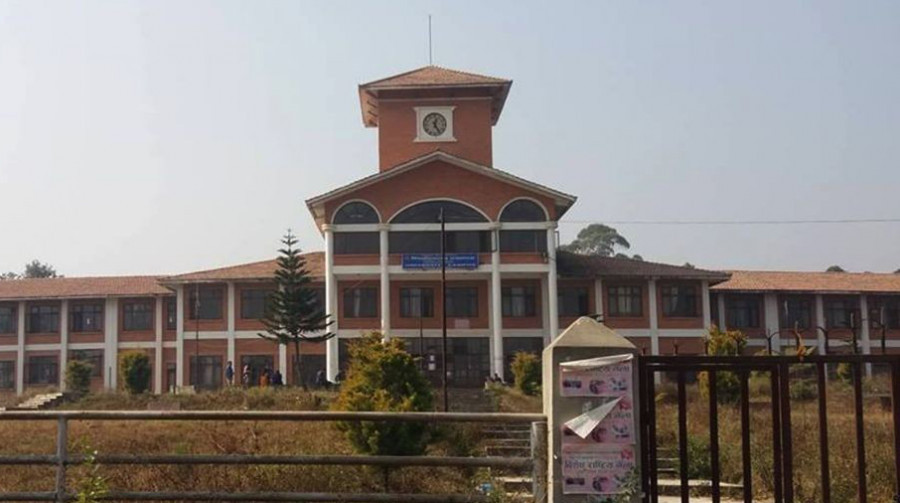National
Congress-aligned professors, students padlock Tribhuvan University office
Ruling party appointing key officials without consulting other parties, they allege.
Binod Ghimire
The main administrative office of Tribhuvan University, which recently opened after the months-long Covid-19 lockdown, has been padlocked by student and professor unions affiliated to the Nepali Congress over the appointment of key officials.
Since 2006, such appointments in government-run universities were made on the basis of “mutual sharing” of posts between the Nepali Congress, then CPN-UML and CPN (Maoist). This is the first time that the Congress did not get to recommend a name for top positions at the oldest university of the country, where around 90 percent of university students in Nepal study.
“We stand against the ruling party’s monopoly in filling vacant positions. Our protest will continue until the recent appointments are scrapped,” said Jagat Timilsina, chairperson of the democratic professor association referring to Prime Minister KP Sharma Oli’s decision to appoint Dr Dharma Kant Banskota as vice-chancellor of the university. Banskota, a few months ago, appointed Shiva Lal Bhusal and Peshal Dahal, both considered allies of the Nepal Communist Party, as rector and registrar respectively.
The democratic professors’ association, which padlocked the administration office, is also dissatisfied with the appointment of the deans of different institutes and faculties at the university. It says except for the Faculty of Humanities, all other appointees are allies of the ruling party. Banskota said that though a majority of university professors are associated with his association, they have been ignored in the appointment process.
Nepal Student Union, the Nepali Congress’ student wing, added another padlock to the administration office demanding that appointments to key university positions be scrapped as the ruling favoured only its supporters for the jobs.
The union on Tuesday threatened a similar protest at Pokhara University demanding that vacant positions be filled based on consensus between political parties.
Tribhuvan University, meanwhile, said that unions resorted to padlocking the office even though it formed a committee to hold dialogue with protesting professors. Rector Bhusal said the university’s administrative work had just begun after the lockdown, but it has been halted due to the protest.
“We can’t formulate or distribute our budget, prepare for exams, publish results or new staffers until the padlock is opened. We urge the protesting parties to sit for talks to resolve the matter,” he said.
Timilsina said they want consensus and transparency in the appointments of the officials at all universities. Currently, the positions of vice-chancellors and registrars are vacant at Pokhara University, Agriculture and Forestry University and Nepal Sanskrit University. “So many senior professors have been left out. We want them to get priority in the appointment process,” he said.
Education experts say though the country has witnessed huge changes recently, the culture of politicisation of academic institutions, however, continues to prevail. “Political affiliation is the only eligibility for appointments, no matter who is in power,” Basudev Kafle, a Tribhuvan University professor and education expert, told the Post.
The protest by the different professors associations is not targeted at improving the education system, but at claiming the share in appointments, he said.
Claiming that appointments at all universities will be made based on merit, selection committees were formed to recommend names last year. After sifting through the resumes submitted by 250 professors and academicians, the committees shortlisted 178.
However, when the appointments were made, political affiliation was given priority over merit.




 18.12°C Kathmandu
18.12°C Kathmandu














